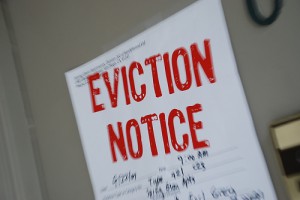The Scariest Way To Be Evicted
Buckle up fellow readers, because I got a tale that’ll make your head spin. The other day I heard one of the saddest and scariest eviction stories in my entire life. It was sad because the evicted tenant was an elderly woman. And it was scary because I had no idea that such an eviction method was even possible until I was told the story by an attorney friend who was handling the case.
My lawyer friend got a call from a frantic woman last week. After calming her down, he began to ask her to tell him what had happened. The woman, Ethel, said she had just been evicted from her apartment less than five hours ago. The surprising thing is that according to her, she was not given notice beforehand at all – not even a few minutes, let alone the standard 30 days. Ethel claimed she was just sitting in her apartment when all of a sudden she heard a loud knock on the door followed by a man shout, “Sheriff’s department, this is an eviction.” Thinking it to be a joke, she went to the door and sure enough, it was a local sheriff who was there to kick her and everyone else in her apartment complex out. Ethel stated she was always on time with her rent and now had nowhere to go.
Such claims are standard fair when it comes to evictions. Most of my lawyer friends tell me that many of their eviction clients tell them that they never had any notice of eviction. Whether or not it’s usually true is up to debate, but the odd thing is that this time it was. Now as mentioned before, tenants do in fact have property rights; however in this case, as Ethel explained, she and her tenant rights weren’t the problem. The problem was her landlord.
 In a strange twist, the landlord was the one who was being evicted by his bank for not being able to keep up with the mortgage payments. The bank then secured a judgment against the landlord, which allowed the bank to seize the apartment complex to recoup on the landlord’s defaulted loan. The problem was that despite the fact that the court ordered the landlord to give notice to his tenants, the landlord failed to tell any of his tenants that both he and they were going to be kicked out.
In a strange twist, the landlord was the one who was being evicted by his bank for not being able to keep up with the mortgage payments. The bank then secured a judgment against the landlord, which allowed the bank to seize the apartment complex to recoup on the landlord’s defaulted loan. The problem was that despite the fact that the court ordered the landlord to give notice to his tenants, the landlord failed to tell any of his tenants that both he and they were going to be kicked out.
Sad story, huh? The immediate question that jumps to mind is that, “what can tenants do to stop this from happening to them?” The scary thing is that the answer might not give you much comfort.
Generally, if a defendant has a judgment secured against them that affect other third parties, that defendant also has a court imposed duty to notify the affected third parties. Usually that duty comes by way of court order. However, like all court orders it’s up to the defendant to decide whether or not to comply with it. If the defendant chooses not to, then the consequence usually is tossing the defendant in jail and/or issuing a fine.
Basically all this means is that if these deterrents aren’t enough for someone like the evicted landlord to comply with the court’s order, then there isn’t much else the landlord’s tenants can actually do to protect themselves from a sudden eviction.
“But what about the bank, don’t they have to do anything?” Well, aside from maybe sending additional notice to the defendant that they’re going to be seizing the property soon, any notice given beyond that isn’t really required.
“Alright, well what about the court?” Minimally, the court can send a sheriff to post a notice of eviction in the lobby of the building to give the tenants notice – which they actually did in this case. The problem was that the landlord removed the notice immediately after the sheriff left. Why? Because some people are just jerks.
Essentially, the only real way for a tenant in this situation to prevent eviction or at least delay it would be to file a notice of claim, which is basically a form that says you have a stake in the lawsuit. The tenant could also try to join themselves into the litigation itself. However, the problem with both of these solutions is that it requires the tenant to know that their landlord is actually being sued. And in this case, no one but the landlord, the bank, and the court knew that eviction was imminent.
Fortunately, because the situation is so unusual, generally the court will have more sympathy for the aggrieved tenants. But recovery of losses will likely be limited to recouping paid rent.
Not much comfort, I know. However, the best advice anyone can give you if you find yourself in a similar situation is to call a lawyer, because it doesn’t get more complicated than this.

Comments
This kind of situation happends frequently. And the usual procedure is basically what the acrticle is showing.
Many people with this kind of situacion can be helped in a legal way, and they should call a lawyer in order to get the best scenario possible out of this.